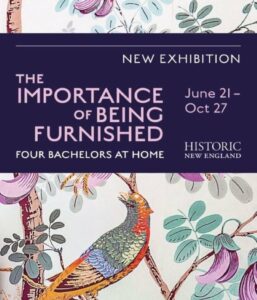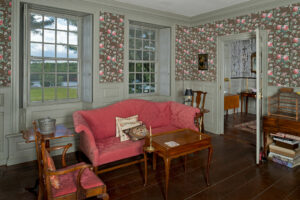 Casey Farm
Casey Farm
Everyone is Welcome at Casey Farm
Casey Farm is one of thirty-eight sites open to the public that is owned and operated by Historic New England. As the leading voice for the region’s history for more than 100 years, Historic New England is committed to sharing history with truth and accuracy. Using research, art, storytelling, and technology, our historic sites increasingly become catalysts for new conversations, recognizing historically marginalized communities and creating a more complete record of all the region’s stories.
You can find concrete evidence of this commitment at Casey Farm every time you take a tour or read content about the farm, and by spending time with the Rhode Island Slave History Medallion or the garden sculpture Three Sisters: RainKeep. Just as people of color, women, working class people, and other marginalized groups have always been a part of this place, queer people have no doubt been here in the past and contributed to the farm’s success. None of these stories have yet come to light at Casey Farm from the days when most queer people were not free to be open about themselves. Today, the organization’s and the farm’s staff includes allies and people who identify as LGBTQ+ making it a welcoming place for everyone. We would love to rent the farm to couples for farm-fancy and queer-friendly weddings!
Other Historic New England sites are centered around well documented stories of queer New Englanders, and we encourage you to read about them and visit them in person or virtually:

The Importance of Being Furnished: Four Bachelors at Home is our premiere exhibition for 2024 and can be viewed from June 21 through October 27 at Eustis Estate Museum in Milton, Massachusetts. This summer, Historic New England invites visitors into the private world of four captivating bachelors—men whose homes defined American style from the Gilded to the Jazz Age, yet whose personal lives have until recently remained mostly in shadow: gambler-collector-dealer Charles Leonard Pendleton (1846-1904), renowned designer Ogden Codman Jr. (1863-1951), writer Charles Hammond Gibson, Jr. (1874-1954), and interior decorator Henry Davis Sleeper (1878-1934).

Sarah Orne Jewett House Museum in South Berwick, Maine, revolves around the author’s decades-long relationship with Annie Fields. Don’t miss the annual Pride Picnic or the Pride Tours. Even if you can’t make it to Maine in person, you can take a virtual tour linked from the property’s page.
 Henry Davis Sleeper’s experiences as a gay man in the early twentieth century at Beauport, the Sleeper-McCann House in Gloucester, Massachusetts are at the heart of the site’s interpretation. Unrequited love for his neighbor and the desire to impress him with ever-evolving interior designs was one of the drivers that created this remarkable place. Pride Tours and events are offered regularly. See a 360 degree tour of the property online and learn more about him in The Importance of Being Furnished.
Henry Davis Sleeper’s experiences as a gay man in the early twentieth century at Beauport, the Sleeper-McCann House in Gloucester, Massachusetts are at the heart of the site’s interpretation. Unrequited love for his neighbor and the desire to impress him with ever-evolving interior designs was one of the drivers that created this remarkable place. Pride Tours and events are offered regularly. See a 360 degree tour of the property online and learn more about him in The Importance of Being Furnished.
 At the Codman Estate, interior designer Ogden Codman, Jr. dictated the design of his family’s country house in Lincoln, Massachusetts and influenced the nation. One of the four bachelors featured in The Importance of Being Furnished, his letters open a window into gay culture a century ago. Specialty tours and a Curator’s Reception are taking place this season. The Codman Arts & Crafts Festival is a highlight in the events calendar in the spirit of Ogden Codman, Jr.
At the Codman Estate, interior designer Ogden Codman, Jr. dictated the design of his family’s country house in Lincoln, Massachusetts and influenced the nation. One of the four bachelors featured in The Importance of Being Furnished, his letters open a window into gay culture a century ago. Specialty tours and a Curator’s Reception are taking place this season. The Codman Arts & Crafts Festival is a highlight in the events calendar in the spirit of Ogden Codman, Jr.
 The 1762 Bowman House in Dresden, Maine is a rare survivor. In 1965, after decades of being empty, the house was saved by designer, historic preservationist, and entrepreneur Bill Waters and his partner, Cyrus Pinkham. The interior is a recreation of Bowman’s world, including objects original to the house and family pieces collected by Waters over his fifty years of stewardship.
The 1762 Bowman House in Dresden, Maine is a rare survivor. In 1965, after decades of being empty, the house was saved by designer, historic preservationist, and entrepreneur Bill Waters and his partner, Cyrus Pinkham. The interior is a recreation of Bowman’s world, including objects original to the house and family pieces collected by Waters over his fifty years of stewardship.
See a more complete look at upcoming LBGTQIA+ events offered at Historic New England sites, and find out how you can support our organization and get invitations to more events through membership.